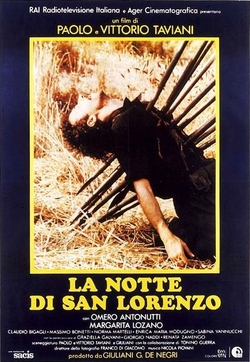Plot
The film opens with a mother telling her sleeping son a story from her childhood. The story recounts how wishes come true when a shooting star occurs. She proceeds to tell the story of the Italian town where she once lived at the end of World War II, in the summer of 1944. [4] The film proceeds following several inhabitants of the town, including a young girl named Cecilia.
A man and his pregnant fiancée marry in the church. After their marriage, the family of the bride quickly celebrate, indicating some trepidation at being caught by the Germans or their allies.
Defeat is certain for the German army and their front is retreating out of Italy. Even so, they leave a path of destruction in their wake. The Germans plan to blow up several buildings in the town and have told all the villagers to congregate in the town's church. Approximately half of the town decides to stay and place their trust in the church. The rest of the town dresses in dark clothing to escape into the night unseen. The groom, first seen in the beginning of the movie, joins the retreating group while his wife and her mother stay in the church. Those who leave hope to find the American army, rumored to be nearby and liberating towns as they arrive.
The bishop wants to say mass with the townspeople in the church. He finds only two pieces of bread for communion. One of the townspeople mentions that she has a loaf of bread. The bishop asks her, and the rest of the congregation, to divide up their bread so he can bless it and use it instead of the standard host. While he is performing communion, the Fascists explode a bomb in the church. The townspeople flee in panic, screaming and crying, pulling bodies out of the church as they try to escape. One girl is seen being carried outside by her mother; it becomes clear that it is the groom's young bride. The bishop tries to help carry the young woman, presumably deceased. As the mother continues to carry her, the young woman's husband returns, discovering it is too late to save her.
The young man returns to his group and they continue their trek. They pass a field where partisans are harvesting the grain. The partisans share their complaints that they're replacing the grain stolen by the Fascists. The group had learned on the road that the partisans can help transport people safely to a city away from the Fascists. The group helps the partisans harvest grain. During the day, the group must hide from German planes that fly over at midday while they are threshing.
Cecilia recounts how there were shooting stars that night –it was a holiday, the night of San Lorenzo, or "night of wishes" [5] –but the people were so caught up in the pain and fear of the moment that they forgot all about it. In the afternoon of the next day, the group is discovered by a small group of Fascists. Both sides begin fighting and sustain casualties, but at the end the Fascists run away. Cecilia watches a Fascist kill her grandfather. As the Fascist comes after Cecilia, she repeats a rhyme that her mother had taught her to say whenever she is afraid. As she says the lines, a Roman soldier appears with a spear and a shield. The soldier throws the spear and pierces the Fascist in the chest. As the Fascist looks up in surprise, a line of Roman warriors appears and throw their spears, killing the Fascist and saving her.
The remaining members of the group survive the fight and find a farm willing to host them. That night, Galvano, the elderly leader of the group, and Concetta, one of the older ladies in the group, share a room, leading them to reveal that they have had feelings for each other since they were young. The group wakes up to the news that the region has been liberated by the U.S. Fifth Army. As they celebrate their new freedom in the rain, they decide to head home.
The mother tells her sleeping son to remember the lines of the rhyme, and it is revealed that the mother is Cecilia, the child in the story.
